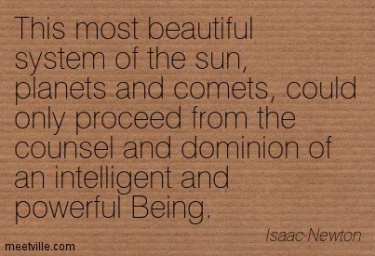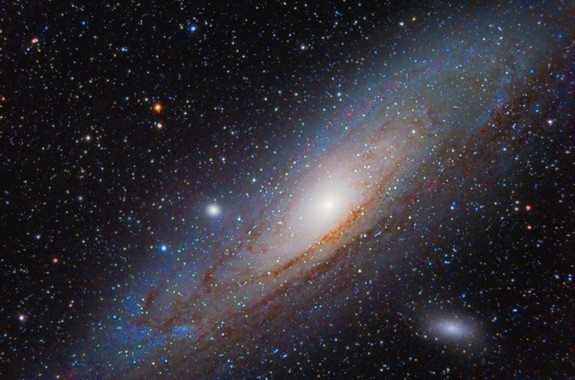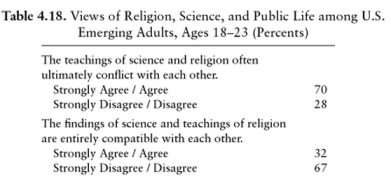“Faith is the great cop-out, the great excuse to evade the need to think and evaluate evidence. Faith is belief in spite of, even perhaps because of, the lack of evidence.” – Richard Dawkins
Is the existence of a creator god a reasonable thing to believe? Is it based on any evidence?
One of the most propagated ideas of the modern age is that science and reason have buried God. That as a species, humanity has evolved beyond the childish idea that we need a god to explain the goings on of the universe and the reality of our existence. That faith and religious belief are directly opposed to the findings of science and so forgo rational thinking. The spiritual realm is now on par with Hogwarts in credibility. In August last year, a study even proposed that religious people are generally less intelligent than atheists.
Along with Dawkins, some of the loudest voices in the public sphere have declared this for the last 150 years.
“Faith means not wanting to know what is true” — Friedrich Nietzsche
“The whole thing [religion] is so patently infantile, so foreign to reality… it is painful to think that the great majority of mortals will never be able to rise above this view of life” — Sigmund Freud
“All thinking men are atheists” – Ernest Hemingway
Such statements have come to dominate much of public opinion. Humanity’s apparent conquest of the natural world has left no room for supernatural, at least for reasonable thinkers. Church is about bringing your wallet in but leaving your brain at the door.
In sociologist Christian Smith’s research into youth and religion in 2005, the largest such study to date, he found that a major reason for 18-23 year old Americans to disengage from religious involvement is scientific evidence, with over two thirds of those asked believing that science and religion ultimately conflict.
But is this true? Does scientific evidence discredit the claims of the bible? Is it reasonable to believe that God exists? Can a Christian be a rational thinker, or must they rely on blind faith in the face of the evidence? Does the God hypothesis hold up under the microscope of science?
The bible is not silent on this issue.
In fact, the bible has an extraordinary answer to these questions. It is that doing science, observing and studying what is around us, leads to knowledge of God. Far from burying him, it exposes and reveals his existence and glory.
“The heavens declare the glory of God; the skies proclaim the work of his hands. Day after day they pour forth speech; night after night they reveal knowledge.” – Psalm 19:1-2
Nature’s grand announcement is that it is not there by accident. The world that God once declared into existence is now declaring the existence of God.
“…since the creation of the world God’s invisible qualities—his eternal power and divine nature—have been clearly seen, being understood from what has been made…” – Romans 1:20
If these statements are true, evidence for God’s existence will be found in the world around us. His signature will be woven into the very fabric of the universe. Humanity will bear something of the image of its Creator. Dusting the surfaces of physics, chemistry and astronomy will reveal his fingerprints.
Some of the great scientists of history seemed to have held such a belief.
“The more I study science, the more I believe in God.” – Albert Einstein
“I believe that the more thoroughly science is studied, the further does it take us from anything comparable to atheism.” – Lord William Kelvin
The bold claim of Christianity is that the evidence of science will reveal and display the glory of God. That when God created everything from nothing, he left a trace. That the creation points to a Creator.
The purpose of this blog is to explore this claim by examining the evidence of modern science and philosophy. Can we detect the fingerprints of a creator?
My hope is that it is useful for you, regardless of your worldview.
Please leave comments or questions – I’d love to engage with them and get a conversation going!


following because I want to see this evidence of a god, any god.
Well-written introduction. I am a believer and follower of Christ and I also have a degree in science education, so I am keenly interested in what you present. Looking forward to it.
Hi Sam,
I managed to find your blog before you sent me the link.
Great first post! (although I am saying this as someone who doesn’t have much blogging experience)
I would recommend the work of Ian Barbour on the topic of the relationship between science and religion, specifically his book ‘When Science Meets Religion: Enemies, Strangers, or Partners?’.
Barbour (2000) proposes that there have been four types of relationships that people over the years have suggested science and religion might have:
1. CONFLICT (claims like: ‘religion contradicts evidence from science’),
2. INDEPENDENCE (claims like ‘science and religion answer entirely different questions, have entirely different functions, et cetera’),
3. DIALOGUE (claims like ‘science and religion interact with one another at the limits of each respective discipline’), and
4. INTEGRATION (claims like ‘science and religion can hope to work very closely with each other and perhaps a philosophical network of ideas linking the two disciplines would go a long way in building these bonds’).
I prefer the last three (as I believe that Conflict-type discussions are not very helpful), but my own thoughts are located somewhere between Dialogue and Integration.
Cheers,
Colin
___
References:
Barbour, I. G. 2000. When Science Meets Religion: Enemies, Strangers, or Partners?, HarperOne, New York.
Thanks Colin! Looks very interesting, I’ll give it a read! At this stage I agree with you in thinking about Dialogue and Integration. The claim that “The heavens declare the glory of God” certainly suggests some integration, though it is clear that there are questions of scripture that are beyond the scope of science, and vice versa.